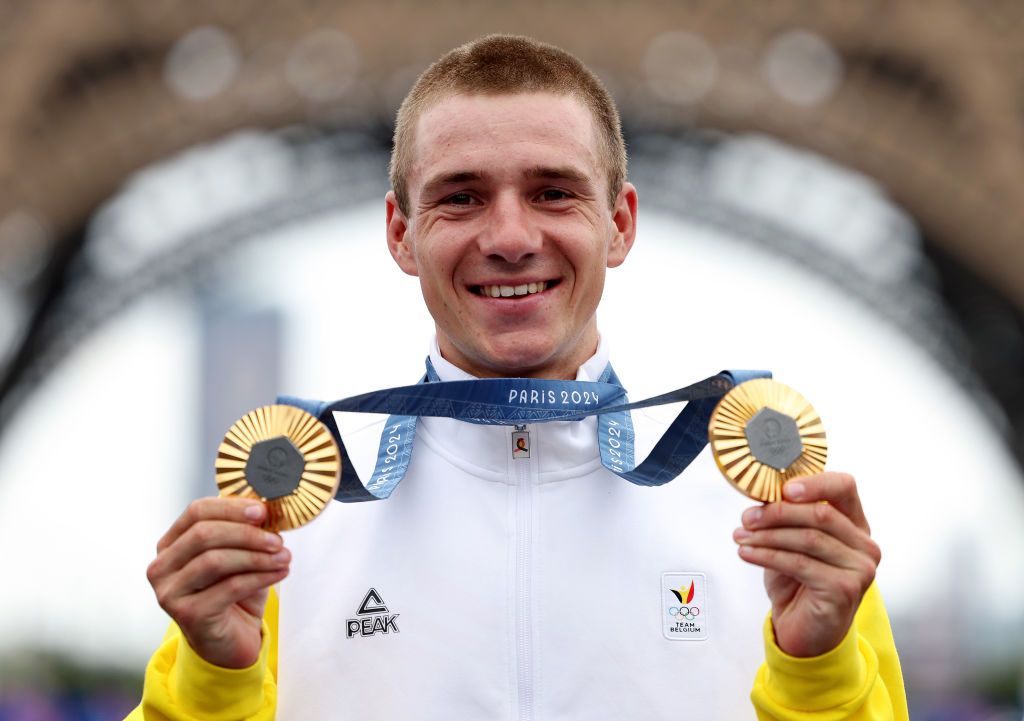A perfect race, the perfect terrain, and a perfect team strategy delivered Belgian Remco Evenepoel to a historic gold medal in the Paris Olympics men’s road race. With the victory, Evenepoel became the first male rider to win both road events at the Olympic Games. Leontien Zijlaard van Moorsel of the Netherlands is the only other athlete to do so, in Sydney in 2000.
But Evenepoel’s road race win came with one heart-stopping moment when, with 3.8km to go, he suffered a puncture. Waving frantically for his team car, Evenepoel believed his medal hopes could have been over when he was within minutes of celebrating in the shadow of the Eiffel Tower.
“I think it was a pretty stressful moment. I think about one kilometre before the incident the motorbike was right next to me and showed me a sign with 25 seconds’ advantage,” Evenepoel explained, noting that the motorbike official showing the time gap was incorrect. His lead was actually around 50 seconds, while the gap between silver medalist Valentin Madouas and the chasing group behind the Frenchman was around 35 seconds.
“That’s why I was a bit stressed actually because I was expecting Valentin and the group behind to pass me straight away;” Evenepoel said.
“I think in the end, I was just unlucky to hit a cobble with my back wheel and the tyre was straightaway flat so I had to change.”
The bike change he received courtesy of the Belgian mechanic was fast enough that Evenepoel still had 1:11 at the finish line. “We did it as smooth as possible, but it was maybe an extra spice on the victory,” he concluded.
Even spicier were Evenepoel’s finish line and podium photos. When he crossed the line, he dismounted his Specialized bike and positioned it in front of him, while the Eiffel Tower was directly behind. Then, on the podium, he drew upon inspiration from Michael Phelps and wore his individual time trial gold medal to receive the second one for the road race.
“Now I have a pretty unique picture for my Instagram,” he said. “I remember the image of Michael Phelps in the past with all these medals around the neck and now I feel a bit like him, so it’s very special.”
Evenepoel explained his telephone call gesture was ‘dialled in’ – a reference to a salute made by tennis player Ben Shelton.
“Having the moments on the last meters of the race were pretty special,” Evenepoel said. “I knew there was ‘just a small building’ behind me so I wanted to enjoy that moment. And I think the finish line picture will be maybe one of the most beautiful ones ever. Arriving in front of the Eiffel Tower was pretty special, so I just wanted to enjoy it as much as possible.”
Evenepoel has already achieved the first Tour de France podium for Belgium since Jurgen van den Broeck was awarded third after the disqualification of Alberto Contador and Denis Menchov in 2010. Before then, Belgium’s last Tour podium was thanks to Lucien Van Impe in 1981.
“I think everybody knows that this month was one of the important this season,” Evenepoel said. “I could achieve my goal in the Tour and now I achieved my goal in the Olympics as well.
“I wanted two medals and one to be gold, but two golden ones is really something that I couldn’t dream of. To do it this year in Paris on a very beautiful finish line as well is something extraordinary, and maybe this is the most beautiful month ever in my career.”
With teams of a maximum of four riders and a peloton of only 90 riders to tackle the 273-kilometre road race, team tactics were crucial and Evenepoel gave his team high praise for their work.
“I think we really showed a strong performance. Tiesj [Benoot] helped to control the race, which was necessary in the end. Jasper [Stuyven] was always ready to be in important moves. And Wout [Van Aert] did what he had to do – follow Mathieu and his big attack on Montmartre. Then after that, it was my moment and I think there we showed what the plan was.
“I think the way we raced was how we spoke about it yesterday evening, and it was executed perfectly. So I think every single one of us deserves an 11 out of 10.”
The Olympic Games reduced the men’s peloton from team sizes of a maximum of five and 132 riders to just 90 this year to allow for the women to have an equal number of competitors. But Evenepoel said he did not have an issue with that.
“It makes it more difficult to take responsibility if you’re only four riders, a lot of teams only had three. We’re used to riding in a bunch of 200 guys, not 90.
“But of course, rules are rules and we have nothing to say about that. So we just have to accept it and then go for it. I think maybe for watching, it would be maybe more spectacular for there to be a bigger bunch. But I’m not complaining.”
Get unlimited access to all of our coverage of the 2024 Olympic Games – including breaking news and analysis reported by our journalists on the ground from every event across road, mountain bike, track and BMX racing as it happens and more. Find out more.

